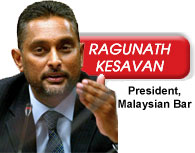The Star
By PRIYA KULASAGARAN
 Due to its complexities, the Federal Constitution has not been of concern to most people. However, an ongoing campaign to detail its contents in simple language may spark an interest in the document.
Due to its complexities, the Federal Constitution has not been of concern to most people. However, an ongoing campaign to detail its contents in simple language may spark an interest in the document.WHILE it is said to represent the will of the people, discourse on the Federal Constitution tends to be limited to lawyers and academics. The most important legal document in the country has been amended over 600 times, yet many citizens lack even a basic understanding of its contents.
With this in mind, the Bar Council has embarked on its MyConstitution campaign, a two-year programme which aims to dissemate information about the workings of the law and rights to the general public.
“The idea is to empower people with knowledge of how their country is governed,” explains Bar Council committee member Edmund Bon Tai Soon.
“The campaign will unfold in nine phases, with each phase reaching the public through informational pamphlets.”
Called the Rakyat Guides, the first in this series of pamphlets deals with the Federal Constitution, drumming home the message that it is the supreme law of the land.
Colourful and handy enough to fit in one’s back pocket, the guide details the mother of all laws in simple and plain language.
“The Constitution is a thick and legalistic document that even lawyers are afraid of,” says Bon.
“So we distilled it right down to the basic facts, which are much easier for the average person to digest.”
Those who are averse to reading may benefit from the campaign’s “Rakyat Service Announcements”, which are one-minute advertisements on the Constitution.
“We also have a team promoting the campaign on the Internet, through channels such as YouTube and Twitter.
“Anything that can help us keep the momentum up for two years, we’ll be on it,” says Bon, proudly adding that the MyConstitution Facebook page has garnered over 3,000 friends thus far.
TimingBon jokes that he never expected such overwhelming response, as the Bar Council’s previous efforts have bordered on the controversial.
“Despite that baggage, we’ve had a lot of demand for workshops and interest in general has been high.
“I have yet to hear a word against this campaign, which is quite rare for our events!”
Even so, with the country still dealing with the aftershocks of last year’s general election results, this crash course on our legal framework seems all too timely.
“We don’t deny that the election played a role in the launch of MyConstitution,” says Bon.
“Issues that have previously been on the backburner, such as democracy, language, special privileges, race and religion, are now very much in the forefront.
“Also, with the current political landscape and the strained relationship between the federal and state governments, people want to understand where the demarcation of power lies.”
He is quick to point out that the campaign is non-partisan, and aims to work with relevant ministries, non-governmental bodies and even corporate companies.
“Basically, we want to work with all sectors of society.
“Before we ran the programme, we had series of public consultations where people could just walk in to take part in discussions.
“At the minimum level, every person said that they wanted to learn about the constitution.”
The old cliche goes that one learns best by doing.
To that effect, Bon has created two interactive workshop modules to be taken into universities and colleges.
“It may not work if students are simply told to read the guides,” he says.
“That is almost like giving them additional homework as it could be difficult to absorb the information without any sort of context.”
Called “Reconstituting Earth Version 2.0”, the workshops work to dispel any notion of boredom by getting participants to create their own society — a concept not that different from many life-simulation games on the market.
Students will then have to identify the elements necessary for this new society to work well, such as justice, fairness and human rights.
“These concepts will help them draft their own constitutions to govern their new world,” says Bon.
“These alternate constitutions will tend to be similar to our own; the participants will see that link themselves and be more prepared to claim ownership of the Malaysian constitution.”
As the campaign targets those aged between 15 and 35, there are plans to take the workshops to schools as well.
“We plan to work with the Education Ministry on this, but we don’t want to force anyone,” says Bon.
“If schools or Parent-Teacher Associations want us to run classes for them, we would be more than willing to oblige.”
While Malaysians are ever-ready to point out flaws in the way the country is run, a more productive effort may be to analyse why these problems exist in the first place.
“By comprehending the framework on which our nation was built on, people will understand the fabric of society and how we’re supposed to live together,” says Bon.
“It is not enough to demand for your rights, because you also need to know about your duties to society.”
He concedes that all nations have violated their constitutions at one point or another.
“The real question is whether there are independent courts to adjudicate such matters fairly, and if they can give effective redress.
“In Malaysia, one of the most crucial ammendments to the constitution was made in 1988, which basically made the courts subservient to the Parliament.
“In my opinion, this limited power of the courts not only affects public perception of the judiciary, but also destroys the spirit of the constitution.”
At this juncture, Bon pauses his passionate rant to say; “Of course, what I’m talking about may be complete nonsense.”
Elaborating that the constitution is open to various interpretations, he stresses the need for people to formulate their own opinions based on concrete facts.
“This is why we made sure that the Rakyat Guides are presented in a clear-cut manner, so that people can read the law to figure out issues and problems for themselves.
“If more Malaysians understand the basics, we can improve the governance of the country, because then those in power will know that they can’t mess around with the people.”
> To download copies of the Rakyat Guides and for information about the My Constitution campaign, please visit:www.perlembagaanku.com.







 By Neville Spykerman - The Malaysian Insider
By Neville Spykerman - The Malaysian Insider

 The Malaysian Bar is disappointed with the Court of Appeal’s ruling last week that the Malaysian Anti-Corruption Commission can question witnesses beyond office hours. The decision, which overturns the High Court’s earlier ruling, is inimical to the protection of witnesses, who have the right to refuse to be interrogated outside of office hours.
The Malaysian Bar is disappointed with the Court of Appeal’s ruling last week that the Malaysian Anti-Corruption Commission can question witnesses beyond office hours. The decision, which overturns the High Court’s earlier ruling, is inimical to the protection of witnesses, who have the right to refuse to be interrogated outside of office hours. 


 By Asrul Hadi Abdullah Sani- The Malaysian Insider KUALA LUMPUR, Dec 21 — Inspector-General of Police Tan Sri Musa Hassan says the government will seek an extradition order for Raja Petra Kamarudin if the fugitive blogger is found to be living in London.
By Asrul Hadi Abdullah Sani- The Malaysian Insider KUALA LUMPUR, Dec 21 — Inspector-General of Police Tan Sri Musa Hassan says the government will seek an extradition order for Raja Petra Kamarudin if the fugitive blogger is found to be living in London. 





 Due to its complexities, the Federal Constitution has not been of concern to most people. However, an ongoing campaign to detail its contents in simple language may spark an interest in the document.
Due to its complexities, the Federal Constitution has not been of concern to most people. However, an ongoing campaign to detail its contents in simple language may spark an interest in the document. As the embassy's labour attache Teguh Hendro Cahyono pointed out, "They have been abused, physically and mentally, put to the grind like slaves, denied their rightful pay and some were raped."
As the embassy's labour attache Teguh Hendro Cahyono pointed out, "They have been abused, physically and mentally, put to the grind like slaves, denied their rightful pay and some were raped." But more than the embassy's coffers, Teguh is worried that the long wait is causing untold opportunity costs to residents whose life will have to be put on hold.
But more than the embassy's coffers, Teguh is worried that the long wait is causing untold opportunity costs to residents whose life will have to be put on hold. Instead she was forced to handle the dual job of domestic maid and assistant mechanic at her employer's workshop.
Instead she was forced to handle the dual job of domestic maid and assistant mechanic at her employer's workshop. Meanwhile, for 19-year-old Silustari, the coming new year will mark her fourth year in the country, having entered Malaysia from Jawa Timur when she was just 16 as a domestic helper.
Meanwhile, for 19-year-old Silustari, the coming new year will mark her fourth year in the country, having entered Malaysia from Jawa Timur when she was just 16 as a domestic helper. "I hope that Malaysia can help us with our cases, so that we can go home sooner. It has been a long while. I miss my family."
"I hope that Malaysia can help us with our cases, so that we can go home sooner. It has been a long while. I miss my family." The joint committee is a cooperative effort by Indonesian Embassy officials and representatives from the Malaysian police, immigration, AG's chambers, Home Ministry and the Ministry of Human Resources to solve the issue of backlogged cases facing those awaiting deportation.
The joint committee is a cooperative effort by Indonesian Embassy officials and representatives from the Malaysian police, immigration, AG's chambers, Home Ministry and the Ministry of Human Resources to solve the issue of backlogged cases facing those awaiting deportation.